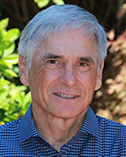
Patrick H. O'Farrell
University of California, San Francisco
|
Primary Section: 22, Cellular and Developmental Biology Membership Type:
Member
(elected 2017)
|
Biosketch
Patrick O’Farrell is a developmental biologist recognized for his work exploring mechanisms controlling where and when cells divide during embryonic development. O’Farrell has a French Canadian heritage and was raised in a peripatetic family with a father serving in the Canadian army. He graduated with B.Sc. in Genetics from McGill University in Montreal in 1969. As a graduate student in the Department of Molecular, Cellular and Developmental Biology at the University of Colorado at Boulder he developed an influential method of highresolution two-dimensional electrophoretic separation of proteins. He was a post-doctoral fellow at University of California at San Francisco during the heyday of the development of recombinant DNA technology. He joined the faculty of the Department of Biochemistry and Biophysics, at UCSF in 1979. There, he has led a research group that has explored a variety of questions in embryonic development. He is a member of the American Academy of Arts and Sciences and of the National Academy of Sciences.
Research Interests
Patrick O’Farrell began his career wanting to understand the “miracle” of embryonic development. He chose to use genetics as his guide and Drosophila as the experimental organism. His laboratory participated in a revolutionary decade in developmental biology. In the 1980s the genes governing patterning were discovered, cloned and the circuitry of their regulation defined. His laboratory demonstrated that the homeotic class of regulatory proteins are DNA binding proteins and regulators of transcription, and they detailed aspects of the circuitry subdividing the embryo. At the close of this period, the O’Farrell lab sought to understand how these genes governed morphogenesis. They identified numerous regulators of cell cycle progression, and showed how patterning genes regulated these cell cycle genes to guide embryonic cell proliferation. Current work seeks to define the timer or clock that paces early development and coordinates cell cycle progression with onset of regulated transcription. A recent fascination in the potential of genetic conflicts to disrupt biological order has led to a new effort. To explore such conflicts, the lab developed tools to analyze mitochondrial genetics. They have uncovered sophisticated nuclear programs that oversee the potentially unruly behavior of the mitochondrial genome.

